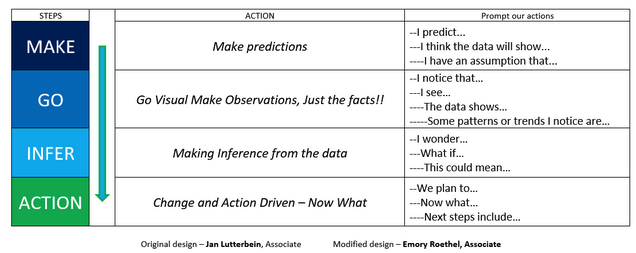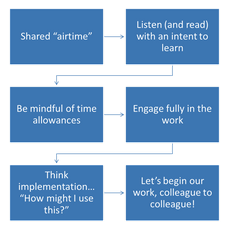The purpose of the data team process is to analyze data, identify trends, and establish goals and action steps. But has that process stayed the course for your data team or gone off the path and into the weeds? Does your current data process foster the best questions to identify the right goals and action steps? Digging immediately into data without establishing a clear set of norms, direction or process can lead teams down the wrong path. This often leads to frustration, lost time, and the selection of ineffective solutions and strategies.
1. Consider a tight process examination to make decisions with data
Using a tight data process supports productive conversation, allows for variety and convergence, and guides paths for action planning. Specifically, strong data processes:
- Allow the group to slow down, and fully participate by understanding what they are reviewing.
- Give each person a voice.
- Provide opportunities and guidance for new data insights.
- Fosters the development of better and clearer questions, leading to improved options for action planning and serving our students.
2. Use the Data Driven Dialogue Protocol to Drive Collective Action
One data team process we recommend is the Data Driven Dialogue Protocol (DDDP). The four phases of this data-driven dialogue assist groups in making shared meaning of data, driving them to collective action.
This protocol builds awareness and understanding of each participant’s viewpoints, beliefs, and assumptions about data while suspending judgements. The DDDP provides the opportunity for the “Aha!” moment - what we might call the experience when someone finally “sees” the composite data picture in a new way. The more bound a person is by their initial perception, the more powerful the “Aha!” experience is. It’s as though a light is suddenly turned on inside of our brain. Hunches bind us, data can “unbind” us.
All participants have equal voice in this protocol. The phases of the data-driven dialogue assist groups in making shared meaning of data. This is why PLC Associates’ Data Cafes and Metrics, which select and engage a broad range of stakeholders, and use protocols like the DDDP, can be so impactful on improvement.

3. Norm and provide purpose for your data-team
Before you begin using DDDP, it is important for your team to review and confirm your norms and purpose for the work. A sample set of norms include:
- Take an inquiry stance – transform learning into action.
- Assume positive intentions – be adaptable to your learning and thinking of others.
- Ground statements in evidence - data-based thinking and actions are based on reality, not hunches.
The DDDP takes this one step further: Since this protocol supports equal voice and engagement, all team members are encouraged to participate. I suggest using an online document like this one (feel free to make a copy!) to support this work and record team conversations. This practice allows teams to share a common space in which all participants can contribute synchronously and can go back and review as their data-based actions unfold.

Better Learner Outcomes Happen with Better Data Review
The more we engage data-teams in using protocols like the DDDP, the better outcomes we can achieve leveraging data. The DDDP helps teams take responsibility for understanding their basic assumptions and their biases. It allows teams to examine their assumptions and experiences, test them against reality (data), listen to others and be open to their perceptions, thereby getting a clearer picture of what actions to take that really make an impact.
In the words of Thoreau, “For every thousand hacking at the leaves of evil, there is one striking at the root.” We can only achieve quantum improvements in our lives (and classrooms) as we quit hacking at the leaves of attitude and behavior and get to work on the root, the paradigms from which our attitudes and behaviors flow.
I encourage you to try using the DDDP with your teams and let us know if the protocols help you deepen your understanding of your data and guide helpful decisions to address learner outcomes. You can download an example of the Data Driven Dialogue Protocol (DDDP) here:
References:
Covey, S. (2013). The 7 Habits Of Highly Effective People. Simon & Schuster.
Accomplish Great Things in Your District
We work with you to close gaps, replicate best practices, and build high-impact, sustainable systems.
Let’s Chat About How We Can Help
Reach out to PLC Associates for a 15-minute solutions conversation.
Call us directly at 1-800-774-6801. We look forward to talking with you.

